Modern humanity tends to look back at the past and see it as better than it used to be. We remember a time in the past where things were simpler, where people were nicer, and where people lived better than they do today. There are several cognitive illusions which play into this misperception of the past, and it can lead us to make bad judgments about the present and poor decisions about how we and others should live. This misperception of the past is partly due to the fact that as children and teenagers we lived in a world where someone else was responsible for providing for our needs. It is partly due to the fact that our brains don’t remember the negative aspects of past experiences as much as the positive aspects of the past. The reality of childhood combined with cognitive errors is what gives us political movements that denounce modernity in favor of a past that never truly existed.
Steven Pinker references historian Ben Kiernan when he writes about this in his book The Better Angels of Our Nature. He writes, “time and again [utopian ideologies] hark back to a vanished agrarian paradise, which they seek to restore as a healthful substitute for prevailing urban decadence.” When we think about utopian human societies, we don’t always project forward as much as we project backwards. We picture a semi nomadic and agrarian life, but with much better tools and technology. Urban living is decadent, as in declining and decaying. We don’t see humanity flourishing in modern urban environments, which could be a problem for how we approach modern living.
Tyler Cowen often argues that we should be leaning into big business, technological development, and economic prosperity more than we do. Advances in living standards, improved vaccines and pharmaceuticals, and better technology are what allow us to live longer, healthier, and more fulfilling lives, Cowen often argues. We should be projecting utopian views that enhance economic and commercial activities, not utopian views that shun them. Unfortunately, however, when we think about human urban living and economics, we see something negative in ourselves and our futures. Pinker continues, “commercial activities, which tend to be concentrated in cities, can themselves be triggers of moralistic hatred.”
Transactional capitalism is somehow seen as one of the negative elements of our urban decadence. Most people don’t seem to view it as Pinker does, as a pacifying force that unites people unlike any other force in the world. People don’t see economic and commercial activities the way Cowen sees them either, as forces that drive the flourishing of humanity and humanity’s potential. We look back with longing on agrarian paradises that no longer exist, without recognizing the cognitive errors which give rise to the false views of our former societies. We remember the past as being better than it was, and only see decadence around us when we should be seeing the improved living standards, the protection from diseases, and the more exciting and entertaining lives that urban living and economic advancement have given us.









